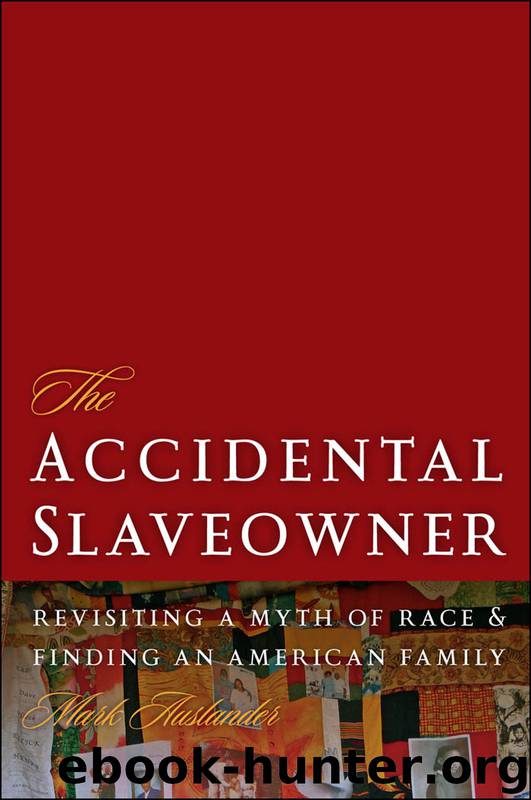The Accidental Slaveowner by Mark Auslander

Author:Mark Auslander
Language: eng
Format: epub
ISBN: 978-0-8203-4192-7
Publisher: University of Georgia Press
Published: 2011-09-30T16:00:00+00:00
Kitty in Newton County
In any event, it is difficult to say how long Kitty resided in Augusta in the Andrew household. She must have worshipped with the Andrews in St. John Methodist Episcopal Church, where the Bishop had previously served as senior pastor. In the 1830s the African American membership of St. John’s numbered 323 out of 610 members. In 1840, 125 African American members of St. John’s famously processed bearing torchlights to a new spiritual home, a brush arbor, at Eighth and Taylor streets in Augusta, to establish the congregation that after the Civil War would become known as Trinity Colored Methodist Episcopal Church. It is quite possible that Kitty’s kin were members of this congregation. By 1840, however, Kitty was residing in Newton County, and may have lost touch with family and friends in the Augusta African American community.
Bishop Andrew had settled his household near Covington, the county seat of Newton County, during the winter of 1836–37. He purchased a plot of land he named Chestnut Grove, where he seems to have settled his family until autumn 1840. It seems likely that Kitty was already part of the household when the Andrews moved to Newton County in late 1836, although there is no direct proof. G. G. Smith, Andrew’s biographer, notes that from 1836 to 1839 there is a striking absence of surviving correspondence by the Bishop, and Smith himself has few details on this period in Andrew’s life. From real estate and tax records, we know that Bishop Andrew was joined at some point in the late 1830s by his mother, Mary Cosby Andrew, who acquired property nearby and resided there with her slaves.
By the summer of 1840, when the federal census was enumerated, a female slave who must be Kitty is recorded as part of the Andrew household in “town” (which must mean Covington). Also in the household is a male slave who must have been Billy, inherited by Ann Amelia from her mother, Catherine Stattler McFarlane, who had been visiting the Andrew family in Covington when she died several months earlier, on April 1, 1840. (Presumably, Billy accompanied her during this visit.) The Andrews during summer 1840 appear to have made plans to relocate to the nearby new town of Oxford, site of the recently established Emory College, where Bishop Andrew served as the first president of its board of trustees. Andrew had been instrumental in the founding of the college in 1836. The college officially opened in 1839.
In November 1840 Bishop Andrew traveled west on church business. On November 21 he wrote to his daughter Elizabeth, whom he believed was still living at Chestnut Grove. He jokingly mentions, “Your mother has transferred her headquarters to Oxford,” and notes that he is unsure which household members have been moved to the new home in Oxford. He concludes, “My love to all at home, white and black.”14 Two weeks later, on December 5, the Bishop wrote to his wife, Ann Amelia, the oftquoted passage, “Tell Kitty I wish I could drink a cup of her best coffee this morning.
Download
This site does not store any files on its server. We only index and link to content provided by other sites. Please contact the content providers to delete copyright contents if any and email us, we'll remove relevant links or contents immediately.
| General | Discrimination & Racism |
Nudge - Improving Decisions about Health, Wealth, and Happiness by Thaler Sunstein(7711)
The Fire Next Time by James Baldwin(5451)
iGen by Jean M. Twenge(5418)
Adulting by Kelly Williams Brown(4579)
The Sports Rules Book by Human Kinetics(4393)
The Hacking of the American Mind by Robert H. Lustig(4386)
The Ethical Slut by Janet W. Hardy(4260)
Captivate by Vanessa Van Edwards(3842)
Mummy Knew by Lisa James(3694)
In a Sunburned Country by Bill Bryson(3544)
The Worm at the Core by Sheldon Solomon(3488)
Ants Among Elephants by Sujatha Gidla(3468)
The 48 laws of power by Robert Greene & Joost Elffers(3293)
Suicide: A Study in Sociology by Emile Durkheim(3024)
The Slow Fix: Solve Problems, Work Smarter, and Live Better In a World Addicted to Speed by Carl Honore(3012)
The Tipping Point by Malcolm Gladwell(2927)
Humans of New York by Brandon Stanton(2873)
Get What's Yours for Medicare: Maximize Your Coverage, Minimize Your Costs by Philip Moeller(2754)
Handbook of Forensic Sociology and Psychology by Stephen J. Morewitz & Mark L. Goldstein(2705)
